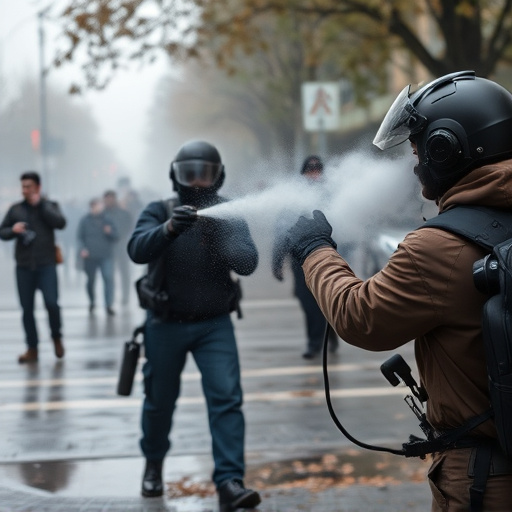Pepper spray, using capsaicin from chili peppers, temporarily incapacitates attackers by overstimulating nerve endings in sensitive areas like eyes and face, causing symptoms like blindness, coughing, and difficulty breathing. Unlike common belief, it does not cause permanent blindness; effects last 30 seconds to several minutes. Correct usage involves aiming at sensitive areas at a safe distance, practicing deployment techniques, and following manufacturer instructions. Responsible use is crucial, employing pepper spray as a last resort for personal safety.
“Discover the power of chemical irritants, specifically pepper spray, as a vital personal protection device. This comprehensive guide explores the science behind its effectiveness, addressing common myths about blinding capabilities. Learn how pepper spray works, its key components, and why it’s a reliable tool for self-defense. We’ll also navigate safe usage practices, ensuring you’re equipped with knowledge to employ it responsibly, dispelling fears regarding blindness.”
- Understanding Chemical Irritants: The Science Behind Pepper Spray
- Can Pepper Spray Blind You? Debunking Myths and Misconceptions
- Components and Effects: What Makes Pepper Spray Effective for Personal Protection?
- Applications and Usage: How to Use Pepper Spray Safely and Effectively
Understanding Chemical Irritants: The Science Behind Pepper Spray
Pepper spray, a common component in personal protection devices, is a chemical irritant designed to disable an assailant temporarily while allowing the victim time to escape or defend themselves. The active ingredient in pepper spray is capsaicin, derived from chili peppers. When sprayed into the eyes and face, capsaicin triggers nerve endings, causing intense irritation and pain. This overstimulation results in temporary blindness, tears, coughing, and difficulty breathing, effectively creating a safe escape route for the user.
Contrary to a common misconception, pepper spray does not cause permanent blindness. The effects are designed to be short-lived, typically lasting from 30 seconds to several minutes. However, individuals with pre-existing eye conditions or those wearing contact lenses may experience more prolonged irritation. Understanding the science behind chemical irritants like pepper spray is crucial for anyone considering personal protection devices, ensuring they can make informed choices regarding their safety and knowing what to expect in potentially dangerous situations.
Can Pepper Spray Blind You? Debunking Myths and Misconceptions
Many people believe that pepper spray can blind its target, making it a powerful self-defense tool. However, this myth needs to be addressed to understand the reality of pepper spray’s effects. While pepper spray can indeed cause severe irritation and temporary blindness, it doesn’t permanently blinde you. The active ingredient in pepper spray, capsaicin, triggers the body’s natural pain receptors, leading to a burning sensation, tears, and difficulty seeing—but not complete or permanent blindness.
Misconceptions often arise from exaggerated claims or incomplete information. In reality, pepper spray’s primary function is to disable an attacker long enough for you to escape or seek help. It achieves this by causing a physiologic response rather than physical damage. Blindness myths may stem from the intense irritation and disorientation that pepper spray can induce, but it’s crucial to understand that these effects are temporary and typically last only a few minutes.
Components and Effects: What Makes Pepper Spray Effective for Personal Protection?
Pepper spray, a common component in personal protection devices, is an effective deterrent due to its unique chemical composition. The active ingredient, capsaicin, is derived from chili peppers and is known for its powerful irritant properties. When sprayed, it stimulates nerve endings, causing a burning sensation and temporary blindness, which can last anywhere from 15 minutes to an hour. This rapid effect disrupts an attacker’s vision, providing the user with a crucial window of opportunity to escape or seek help.
The mechanism behind pepper spray’s effectiveness lies in its ability to interfere with normal eye function. The chemical irritates the eyes’ sensitive tissues, leading to tearing and inflammation. This reaction is often accompanied by a runny nose, coughing, and difficulty breathing due to the spray’s impact on the respiratory system. While not intended to cause permanent damage, these effects are intense enough to disable an assailant temporarily, allowing for a safe escape.
Applications and Usage: How to Use Pepper Spray Safely and Effectively
Pepper spray, a common chemical irritant used for personal protection, has diverse applications ranging from self-defense to crowd control. It’s crucial to understand its usage and safety measures, especially because pepper spray can temporarily blind you if not handled properly. When using pepper spray, ensure you aim for the eyes, nose, and mouth of the target, as these are sensitive areas. Keep a safe distance, typically 2–3 feet (0.6–0.9 meters), to avoid any accidental exposure that might cause irritation to your own eyes or respiratory system. After deployment, immediately seek a safe location to recover, as pepper spray’s effects can impair visibility and breathing for several minutes.
For effective use, practice with the device before needing it in real-life situations. Always follow the manufacturer’s instructions on how to activate and deploy the spray. Keep pepper spray readily accessible—carried on your person or secured in a vehicle—for quick retrieval when needed. Regularly inspect the spray for any signs of damage or expiration, as these can affect its potency and reliability. Remember, while pepper spray is a powerful tool for personal protection, it should be used responsibly and only as a last resort to ensure safety.
While commonly used for self-defense, it’s important to remember that pepper spray is not designed to blind—it merely irritates the eyes, temporarily disabling them. Understanding the science behind chemical irritants like pepper spray empowers users to deploy these personal protection devices effectively while mitigating common myths. By knowing their components, effects, and proper usage, folks can ensure they’re prepared for unexpected situations without causing permanent harm.
